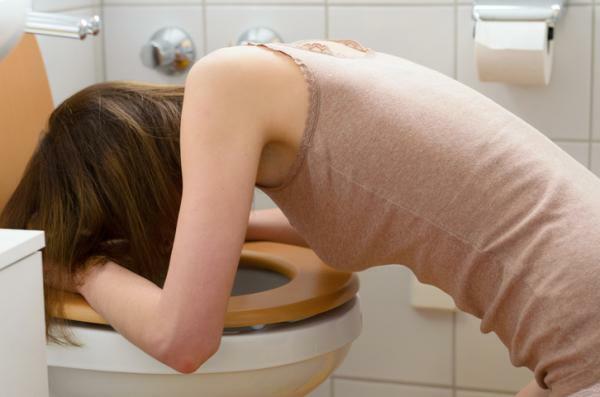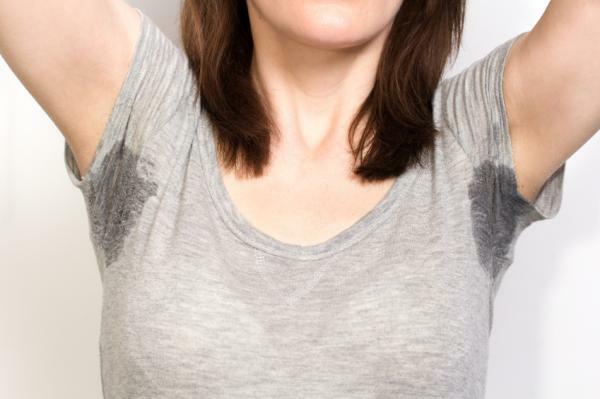
Eating disorders usually develop when adolescence begins, a vital time in which young people begin to develop their independence and parents may exercise less control over their feeding. It is also a time when the parent-child relationship undergoes numerous changes that can end in conflict. In addition, teenage children tend to distance themselves from their parents.
In the developmental stage of adolescence, it is difficult to know if some changes are a normal result of the adolescent development or if they are signs that an eating disorder is beginning to develop. In this Psychology-Online article, we tell you how to know if your daughter has anorexia or bulimia.
Index
- Anorexia and bulimia: similarities and differences
- How do I know if my daughter has an eating disorder
- How can I tell the difference between bulimia and anorexia
- What do I do if my daughter has anorexia or bulimia
Anorexia and bulimia: similarities and differences.
An eating disorder is characterized by a series of improper or irregular eating habits and great distress or concern about weight or body image. These habits can include an inappropriate or excessive food intake that affects the well-being of the person. The most common disorders are
Anorexy
Anorexia is an eating disorder characterized by extremely low weight, difficulty maintaining an appropriate weight, and a distorted body image. People with anorexia restrict the number of calories and the type of food they eat. Some people with anorexia also perform compulsive physical exercise or purgative behaviors such as laxatives, induced vomiting, etc. A girl with anorexia must meet the following DSM criteria:
- Intake restriction of food to lose weight or not gain weight while the person has a weight that is below what is considered normal according to their age, sex and height.
- Fear of gaining weight or gain weight
- Body image distortion. For example, the girl may believe that she is fat when she is really very thin or she thinks that she will gain a lot of weight if she eats a full meal. In addition, they often make excuses or deny that there is a problem with her weight. These thoughts are known as distortions.
- Even if all of these criteria are not met, the eating disorder may be present. Atypical anorexia occurs when a person meets all the criteria for anorexia, but is not underweight despite significant weight loss.
Bulimia
Bulimia is characterized by a cycle in which there are periods in which there is a large intake of food followed by others in which try to compensate for the excess food produced by bingeing by vomiting, use of laxatives, diuretics, excessive exercise physical…
A person with bulimia must meet the following criteria:
- Repeated episodes of binge eating. These episodes are defined by a food intake greater than what we would normally eat for the same amount of time. Also, the person feels that she has lost control over the food and cannot stop.
- Performing inappropriate behaviors to avoid gaining weight or compensating for binges. Professionals often refer to these behaviors as compensatory and can be induced vomiting, laxatives, diuretics and / or enemas, and excessive physical exercise.
- Both types of behaviors, both binge-eating and compensatory, occur at least once a week for 3 months.
- The weight of the person or the body image of her has a significant impact on the assessment that the person makes of her.

How do I know if my daughter has an eating disorder.
Eating disorders They are complex problems that are expressed through behavior, emotions and that have a physical impact on the person's body. The signs can vary greatly between each type of disorder and between each individual. However, if your child has numerous physical, behavioral or psychological signs, she may have an eating disorder.
Symptoms of an eating disorder
How do I know if my daughter has anorexia or bulimia? Some of these signs They may be:
- Eating very small portions of food or not eating
- Intense fear of having a normal weight or being fat
- Distorted body image
- Excessive physical exercise
- Eat in secret
- Disappear after eating
- Major changes in weight
- Social isolation
- Depression
- Irritability
- Little or no awareness of extreme weight loss
- Stomach cramps
- Menstrual irregularities
- Dizziness
- Sleep problems like insomnia or hypersomnia
- Corns or irritation on the finger with which vomiting is induced
- Dry Skin
- Swollen face
- Fine hair on the body
- Weak, dry and brittle hair in the hair
- Tooth decay or discoloration due to vomiting
- Muscular weakness
- Yellow skin
- Cold hands and feet
- Swelling of the feet
How can I differentiate between bulimia and anorexia.
Here are some of the differences between the major eating disorders:
- The weight. The person with anorexia is usually classified as underweight while the person with bulimia may be of normal weight and even slightly overweight. Related to this, the girl with anorexia usually misses her period while in bulimia she may not.
- In general, in anorexia it does not usually happen that the person performs Binge and then remove food from her body by purgative behaviors (bulimia). Although there is a subtype of anorexia called purgative anorexia that does this, it is less common.
- Typically, people with bulimia feel more embarrassed and out of control with their behaviors, as the person with anorexia carefully controls their intake. For this reason, it is more common for girls with bulimia to admit to having a problem, since they do not feel they have control over their behavior. The person with anorexia is more likely to believe that they are in control of her eating and much less likely to admit that the problem exists.
- Both girls with anorexia and bulimia base their self-esteem on their weight and in their perceptions of him. They base their achievements and successes on the result of their body, and for this they are often depressed, since they feel that they are failing in achieving what they consider to be the perfect body.

What do I do if my daughter has anorexia or bulimia.
At first, it is difficult to know exactly how we should act when we discover that someone close to us suffers from an eating disorder. However, with all the information provided, the important thing will be to do an empathy exercise (for example, think how a person with anorexia feels) and follow the steps that we will give you below.
If your daughter has anorexia or bulimia, there are some things you can do to help her overcome her disorder by being supportive:
- read about eating disorders, the more you know the better you'll understand what you're dealing with
- Show him your love for her and that you will always be there for what she needs
- Suggest activities she can do and that do not involve food, how to go out with her friends ...
- Ask him what you can do to help him
- Try to be honest about your own feelings, that will encourage him to do the same with his
- Try to be a role model when it comes to eating through a balanced diet and the practice of physical exercise appropriately
- Try that regain her confidence in herself, for example, reinforce or congratulate him when he makes progress in nutrition, in education ...
During the treatment and intervention of anorexia or bulimia, meals can be very complicated moments, some tips that can help you are:
- If your daughter is in treatment, she asks advice to specialists to cope with meals properly
- Suggest that your daughter go shopping with you and arrange meals with her
- Agree with the family that no one should talk about the number of calories, fat present in certain foods, etc.
- Try to create a positive atmosphere during meals
- If your daughter tries to help with food preparation so that she can continue to control her eating, she politely asks her to remain seated at the table or to perform another task.
- Try not to focus attention on her during the meal, enjoy your own food and try to create a relaxed conversation
- Suggesting an activity after eating, such as watching TV, can help distract her from engaging in purging behaviors.
- Do not despair if at first the food does not go well, it is a slow process
This article is merely informative, in Psychology-Online we do not have the power to make a diagnosis or recommend a treatment. We invite you to go to a psychologist to treat your particular case.
If you want to read more articles similar to How to know if my daughter has anorexia or bulimia, we recommend that you enter our category of Clinical psychology.


